
Today’s motion doesn’t actually legalize street vending. What it does is direct the City Attorney, the Chief Legislative Analyst, and the City Administrative Officer to put together a proposed ordinance. This was to be based on this detailed set of recommendations from the Public Works and Gang Reduction Committee report. This report was amended in Council today before being adopted, and at least two of the amended recommendations are quite sneaky, and, I predict, will undermine the future ordinance in quite underhanded ways that will please business improvement districts and other business interests who have been working tirelessly to keep street vending illegal for years now. See the details and some3 predictions after the break.
First, the original report recommended that the final ordinance include:
A process to create special vending districts to be initiated by Council, the Board of Public Works, or petition (with signatures from 20 percent of property owners or businesses in the proposed district), based on legitimate public health, safety and welfare concerns that are unique to specific neighborhoods with special circumstances.
This was bad enough, as it was meant to give well organized so called “districts” a means by which to opt out of legal street vending. In practice this means BIDs, for the most part. Their fingerprints are there in, e.g., the requirement that property owners or businesses oppose vending, with no input required from residents. This has been a constant theme in BID anti-vending propaganda. Residents can’t be allowed to vote on street vending in a district because they will surely vote the wrong way.
However, the badness of this clause was tempered somewhat by the requirement that the opting out be “based on legitimate public health, safety and welfare concerns.” Of course, BIDs have any amount of money to hire consultants to make a case that their concerns are legitimate. But I believe someone got worried that public health, safety, and welfare4 are too hard to fake. Perhaps that’s why today’s motion was amended by Council to add the word “economic” to that list of reasons for a district to opt out.
For some reason, BIDs and other opponents of street vending are not ashamed to make a case against street vending based on the idea that vendors will compete with businesses located in physical storefronts. This is probably true, and the economically correct response is “so what?” The City is not, should not, be in the business of choosing one business model over another. Competition is healthy for the City. In any case, now that BIDs will be able to use economic concerns to opt out of vending, they will have an easier time making less obviously pretextual arguments against it.
And as if that victory wasn’t enough, today’s amendments added a whole new section to the PW&GR Committee’s report:
Options for a rational analysis to develop and establish criteria that would create and maintain a list of additional no-vending areas that may include any, or all, of the following:
1. City alleys.
2. City-owned property.
3.Providing the City Council the ability to opt out of certain streets by Council action with an accompanying petition of a majority of business/property owners and/or area residents.
4. Providing the City Council the ability to opt out of certain streets by Council action.
What this would do is allow the City Council to prohibit vending on any street it wants to for any reason whatsoever. In effect this item, if it’s included in the final ordinance, will completely obviate the legalization of vending. Powerful neighborhood interests, not least BIDs, will lobby their Councilmembers to exclude their districts. The Councilmembers will do it because they do everything BIDs ask of them. And under the proposed last criterion, opting out by Council action, reasons aren’t even necessary.
What we will see, I predict, is a patchwork of no-vend zones, not based on anything more sensible than localized political power, much as has happened with anti-homeless oversize vehicle parking restrictions. The City Council passes a law allowing living in cars to some extent. They all sit around patting themselves on the back about how they’re helping homeless people, and meanwhile they create dozens of zones where parking RVs is illegal based on nothing more rational than the whining of zillionaires with political juice. These zones will eventually blanket the entire City, leaving the law regulating car-sleeping in place, but making it completely ineffective. The patronage system lives on through a bunch of tiny under-the-radar laws that seem to leave the large scale progressive measures intact, but in reality have the unseen effect, unseen except by the victims who have to move their RVs, who get another citation for vending on the wrong street, of hollowing them out until there’s no substance left at all.
Image of hot-dog vendor at USC is via Wikimedia and you can find out just what that means rights-wise by going there and seeing for your own self.
- Unlike what you’ll find around here, friends!
- The article is excellent, but it makes (at least) two (admittedly commonplace) errors. First, Alpert Reyes quotes the Coalition to Save Small Business as if it had some legitimate existence apart from its origin as bullshit astroturf fraud set up by Carol Schatz and her flock of flying monkeys at the Central City Association and their creepy minions, e.g. Jessica Borek of Rodriguez Strategies, in the subterranean world of unregistered lobbying. Second, she prefaces an idiotic quote from Smilin’ Joe Mariani of the Hollywood Property Owners Alliance with a statement that the HPOA is a “neighborhood group” rather than the heavily-armed covert lobbying arm of about twelve zillionaires who own property on Hollywood Boulevard. There’s nothing neighborhood about these people. But she’s not the first to fall for their subterfuge, and she certainly won’t be the last.
- Possibly, just possibly, paranoid…
- Why do all these people hate the Oxford comma so?
